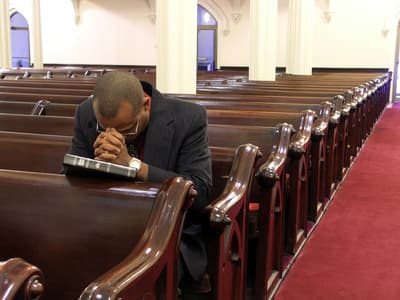Thanksgiving: More Than Just a Day in November

(Photo: Unsplash)
Thanksgiving is almost upon us, and of course that means Christmas is close. Often we put a lot of emphasis at this time of year on Christmas, because retailers are pushing us in that direction. In the process, we can very easily forget this beautiful holiday called Thanksgiving. Originally established by President Washington in 1789, it initially was a religious holiday and, more to the point, a Christian holiday.
Of course, our Thanksgiving today is about gathering with friends and family and having a great meal. But sometimes at this particular time of the year, we can forget about how thankful we ought to be. And we never should forget that God has blessed us to live, in my opinion, in the greatest country on the face of the Earth, the United States of America.
As someone wrote, “If you woke up this morning with more health than illness, you are more blessed than the million who won’t survive the week. If you have never experienced the danger of battle, the loneliness of imprisonment, the agony of torture or the pangs of starvation, you are ahead of 20 million people around the world. If you attend a church meeting without fear of harassment, arrest, torture, or death, you are more blessed than almost 3 billion people in the world. . . . If you have money in the bank, in your wallet, and spare change in a dish someplace, you are among the top 8 percent of the world’s wealthy.”
That puts things in perspective, doesn’t it? We have a lot to give thanks for, and certainly the Bible urges us to give thanks to the Lord. The psalmist wrote, “Praise the Lord! Give thanks to the Lord, for he is good! His faithful love endures forever” (Psalm 106:1 NLT).
The Sacrifice of Thanksgiving
Colossians 3:17 says, “And whatever you do or say, do it as a representative of the Lord Jesus, giving thanks through him to God the Father” (NLT). And Hebrews 13:15 tells us, “Therefore by Him let us continually offer the sacrifice of praise to God, that is, the fruit of our lips, giving thanks to His name” (NKJV).
Yet sometimes worship and thanksgiving can be a sacrifice. We may be down or depressed, or things aren’t going all that well for us. Hardship or tragedy has hit our lives in some way, and we don’t want to thank God. But the Bible doesn’t tell us to give thanks to the Lord because we feel good. Rather, we’re to give thanks to the Lord because He is good.
In the New Testament book of Luke we find a story of thanksgiving. It’s a story of 10 men who were healed of the worst disease imaginable in the first century, the disease of leprosy. It was incurable, and because it also was highly contagious, people with the disease were isolated. The only people they could hang around with were others who also had leprosy.
Luke tells us that as “Jesus continued on toward Jerusalem, he reached the border between Galilee and Samaria. As he entered a village there, ten men with leprosy stood at a distance, crying out, ‘Jesus, Master, have mercy on us!’” (17:11–12 NLT).
His response was interesting. We don’t read of a dramatic touch or any special effects or swelling music. Instead, Jesus gave them a simple command: “Go show yourselves to the priests” (verse 14 NLT).
An Interesting Command
This command didn’t even include a promise of healing. It was simply a command. Now why would they need to show themselves to the priests? The book of Leviticus stipulated that if someone with leprosy was somehow cured, a priest was to examine them as part of an eight-day purification ceremony (see Leviticus 14:2–32). Then they could be reunited with their families.
However, the difference with these 10 men was they weren’t healed yet. So what was the point in all of it? The point was that when Jesus says we should do something, we should do it.
These men could have said, “You know what? We don’t want to do that. We want a big-time healing. Other people got big-time healings. Why can’t we get one? Why can’t you just touch us right now and heal us? Or, just say the word, and we can watch our leprosy disappear.”
They could have complained, but in their defense they obeyed Jesus. They had to take that step of faith. And as they were on their way to show themselves to the priests, they discovered their leprosy was gone.
The Difference Thanksgiving Makes
As they were obedient to God, He answered their prayer. When they realized they had been healed, nine left, but one realized that he needed to return and thank Jesus. Interestingly, the Bible tells us that he was a Samaritan. Now, there was a deep racial divide between the Samaritans and the Jews. Yet this Samaritan man went back to give thanks.
Not only did he give thanks, but the Bible says that “with a loud voice [he] glorified God, and fell down on his face at His feet, giving Him thanks” (Luke 17:15–16 NLT).
Earlier he had pleaded loudly for a healing, and then he was loudly giving thanks to God. In the original Greek, the words “loud voice” are the same two words from which we get the word megaphone. He gave a megaphone of praise to God.
Then Jesus asked him, “Didn’t I heal ten men? Where are the other nine? Has no one returned to give glory to God except this foreigner?” (verses 17–18 NLT).
Perhaps in a way, it is a question that Jesus is still asking today. We are so quick to call on Him in our hour of need, but when He comes through for us, how about some worship? How about some thanksgiving? We are quick to ask for help, but we are slow in returning thanks.
As we approach God to ask for new blessings, we should never forget to return thanks for the blessings He has already given. We should be just as definite in giving thanks as we are in requesting help.
There is so much to give thanks for. Have you been thanking God? Don’t wait until Thursday. Give thanks to Him today.




